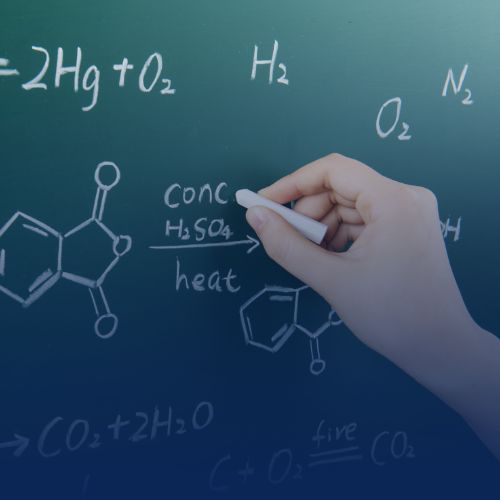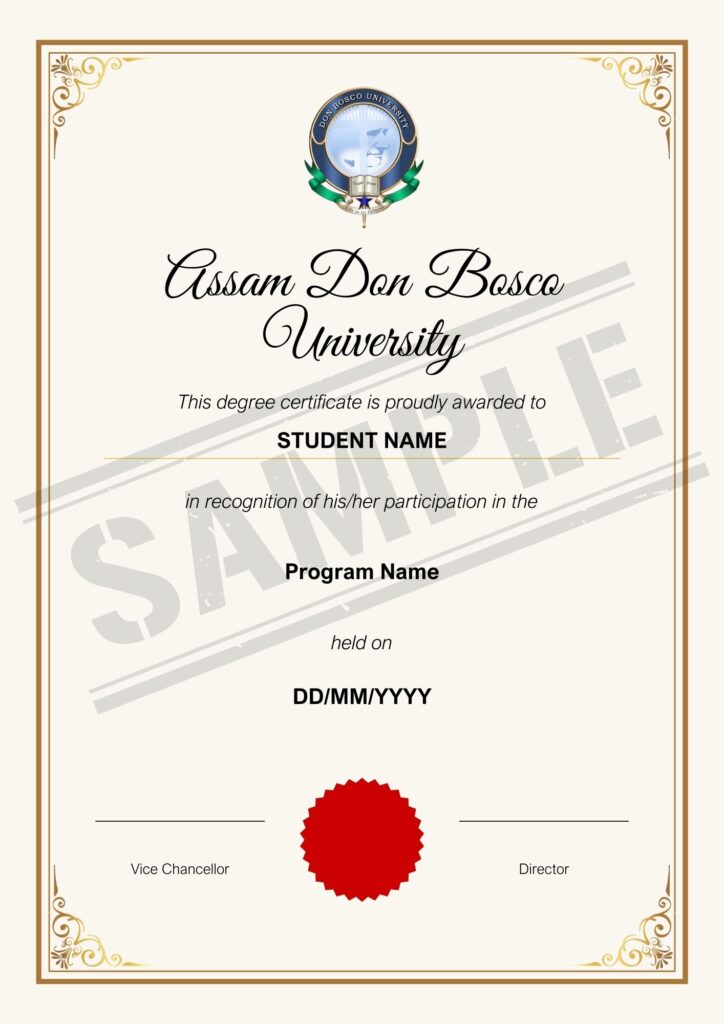Test Program
BSc in Chemistry
Duration: 03 Years
BSc in Chemistry
The Department of Chemistry started functioning as an independent department in Assam Don Bosco University, from 1st April 2018 onwards. Prior to this date, the department was serving as a constituent of the Department of Basic Sciences, teaching Chemistry courses to the undergraduate engineering students of the University.
Since July 2017 the department began offering a two-year (4-semester) MSc programme in Chemistry. From July 2018 onwards, the department began offering a three-year (six-semester) BSc Honours course in Chemistry with students opting for general electives in Physics and Math or Botany and Zoology.

Program Highlights and Advantages
Discover our Degree Programs and begin an exciting educational journey

Emerging specializations
New-age specializations shaping tomorrow's business landscape

Robust Learning Model
550+ hours of video lectures to help you maximize your learning

Personalized Learning
Personalized learning through unique option of choice based credit system

Real World Projects
Real world projects & case studies to help you succeed in your domain
Program Overview & Structure
| Inorganic Chemistry-I: Atomic Structure & Chemical Bonding |
| Physical Chemistry-I: States of Matter & Ionic Equilibrium |
| Inorganic Chemistry-I: Atomic Structure & Chemical Bonding – Lab |
| Physical Chemistry-I: States of Matter & Ionic Equilibrium – Lab |
| English Communication |
| General Elective – I (Maths) |
| General Elective – I (Zoology and Zoology Lab) |
| Organic Chemistry-I: Basics & Hydrocarbons |
| Physical Chemistry-II: Chemical Thermodynamics & its Applications |
| Organic Chemistry-I: Basics & Hydrocarbons |
| Physical Chemistry-II: Chemical Thermodynamics & its Applications – Lab |
| Environmental Studies |
| General Elective – II (Maths) |
| General Elective – II (Zoology – Theory and Lab) |
| Inorganic Chemistry II: s- and p-Block Elements |
| Organic II: Oxygen Containing Functional Groups |
| Physical Chemistry III: Phase Equilibria & Chemical Kinetics |
| Inorganic Chemistry II: s- and p-Block Elements – Lab |
| Organic Chemistry II: Oxygen Containing Functional Groups – Lab |
| Physical Chemistry III: Phase Equilibria & Chemical Kinetics – Lab |
| Skill Enhancement Course – Elective I Basic Analytical Chemistry, Chemo informatics, Chemistry of cosmetics and perfumes |
| General Elective –III (Physics – Theory and Lab) |
| GGeneral Elective –III (Botany – Theory and Lab) |
| Inorganic Chemistry III: Coordination Chemistry |
| Organic Chemistry III: Heterocyclic Chemistry |
| Physical Chemistry IV: Electrochemistry |
| Inorganic Chemistry III: Coordination Chemistry – Lab |
| Organic Chemistry III: Heterocyclic Chemistry – Lab |
| Physics Chemistry l IV: Electrochemistry – Lab |
| Skill Enhancement Course – Elective II Pesticide Chemistry, Fuel Chemistry, Intellectual Property Rights |
| General Elective IV (Physics – Theory and Lab) |
| General Elective IV (Botany – Theory and Lab) |
| Organic Chemistry IV: Biomolecules |
| Physical Chemistry V: Quantum Chemistry & Spectroscopy |
| Organic Chemistry IV: Biomolecules – Lab |
| Physical Chemistry V: Quantum Chemistry & Spectroscopy – Lab |
| Discipline Specific Elective I Applications of computers in Chemistry, Analytical methods in Chemistry, Applications of computers in Chemistry Lab, Analytical methods in Chemistry Lab. |
| Discipline Specific Elective II Novel Inorganic Solid, Polymer Chemistry, Novel Inorganic Solid Lab, Polymer Chemistry Lab. |
| Inorganic Chemistry IV: Organometallic Chemistry |
| Organic Chemistry V: Spectroscopy |
| Inorganic Chemistry IV: Organometallic Chemistry – Lab |
| Organic Chemistry V: Spectroscopy – Lab |
| Discipline Specific Elective III Green Chemistry, Inorganic materials & Industrial Importance, Green Chemistry Lab, Inorganic materials & Industrial Importance Lab |
| Discipline Specific Elective IV Industrial Chemicals & Environment, Research methodology for Chemistry, Industrial Chemicals & Environment Lab, Research methodology for Chemistry Lab. |
Degree offered by us

Eligibility
Grade /Marks requirement from qualifying examinations
Passed the qualifying examination with Physics/ Mathematics /Chemistry/ Computer Science/Electronics/Information Technology/ Biology/Informatics Practices/ Biotechnology/Technical Vocational subject/ Agriculture/ Engineering Graphics/ Business Studies/Entrepreneurship with 45% in the aggregate of all subjects and 45% in the aggregate of any of the three
Entrance Examinations / Personal Interview
National Entrance Test such as JEE / State level entrance examination such as CEE or the ADBU Entrance Examination for Engineers
Career Impact
How We Help You Build Your Dream Career
Industry Mentors
Personalized guidance from career experts throughout the academic journey.
Placement Drives
Connect with employers & explore opportunities through interactive online events.
Master Classes
Access comprehensive help for resume building, interview preparation and job placement.
Profile Building
Build a credible professional profile by showcasing your skills through hands-on projects.
F.A.Q.
The university offers a range of undergraduate, graduate, and doctoral programs across disciplines including engineering, science, arts, business, and health sciences. Each program has its own specific requirements and areas of focus.
You can apply online through our university’s admissions portal. Complete the application form, submit the required documents (such as transcripts, test scores, and recommendation letters), and pay the application fee. Detailed instructions are available on our admissions webpage.
Admission requirements vary by program. Typically, undergraduate programs require a high school diploma and specific academic credentials, while graduate programs may require a bachelor’s degree in a related field, relevant test scores, and work experience. Be sure to review the specific requirements for the program to which you are applying.
Yes, the university offers a variety of scholarships and financial aid programs based on academic merit, financial need, and other criteria. Information about available scholarships and how to apply is available on the university’s financial aid webpage.
Application deadlines vary depending on the program and the intake period (e.g., fall, spring). Be sure to check the program’s admissions page for specific deadlines.
